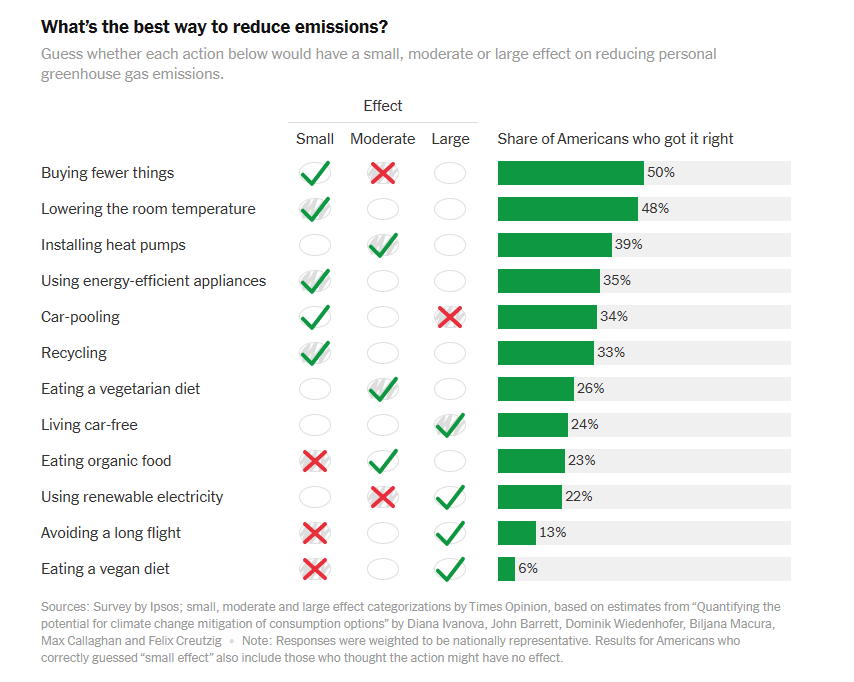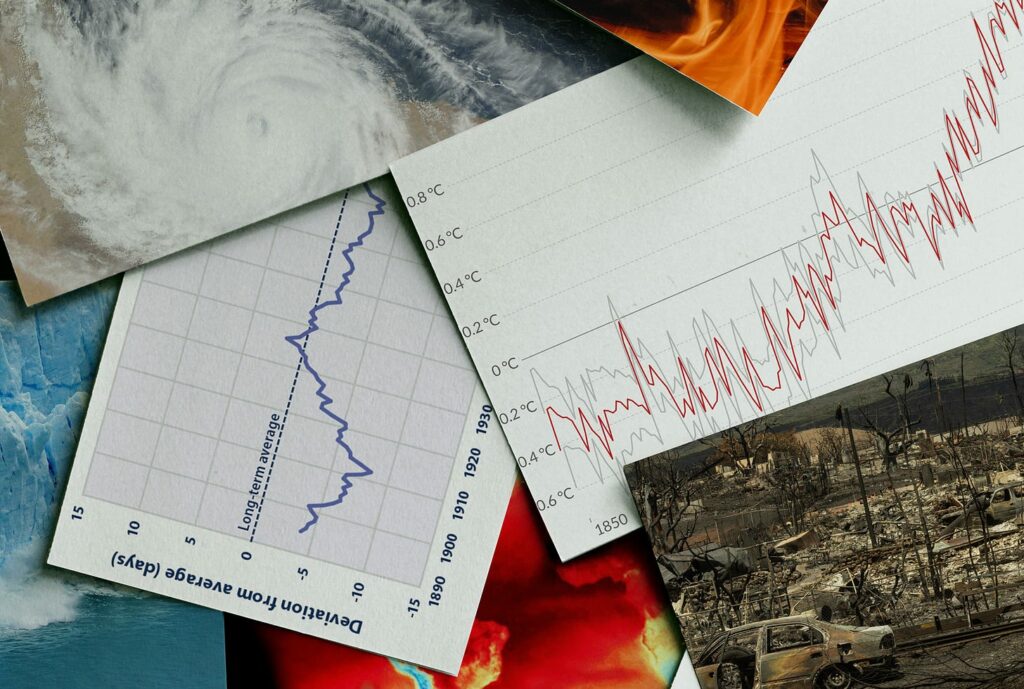After decades of being told that climate change can be solved with a few small lifestyle changes you might be surprised to see a climate alarmist like the New York Times “Graphics Editor, Opinion” Gus Wezerek (because everyone’s a climate scientist, at least if they espouse orthodoxy) heckling his fellows for not realizing the magnitude of the sacrifices that the movement really has in store for us. So at least they admit it. And they admit that the public is not onside with the agenda. Which they naturally blame on industry-funded conspiracies, rather than their own failure to explain what they had in mind.
Wezerek starts with a sympathy ploy. He says:
“Like most of my friends, I’ve settled on a small list of sacrifices that I’m willing to make to try to stop climate change. I’m a vegan. I unplug the microwave when I go on vacation. And I drive a 2009 Toyota Camry hybrid. That’s pretty good, right?”
Some of us don’t think going vegan is a small sacrifice. Nor does everyone have (or want) friends who fret about their carbon footprint morning noon and night. But we shall put such quibbles aside because the key point is that “while working with Sander van der Linden on his guest essay and quiz about the most and least effective ways to shrink your carbon footprint” he discovered he was himself a planet-trashing clod.
Now van der Linden is of course a climate scientist. Or, to be technical, “a professor of psychology at the University of Cambridge” who “has been studying how people think about climate change for more than a decade.” And while apparently the sorts of people he studies are growing more anxious about climate, their “practical knowledge about what we can do to counter it is lacking.”
Unlike his and his graphic artist’s. So they teamed up with the climate scientists at Ipsos to “test about 1,000 Americans on whether 12 different actions would have a small, moderate or large effect on reducing greenhouse gases” from “common recommendations, like recycling and using renewable electricity” to “more arcane strategies, like installing heat pumps.”
Of course the punchline is going to be a plate full of bugs, or owning nothing and being happy, or something of that sort. And so:
“The results that Ipsos sent back were dispiriting. Only one question was answered correctly by a majority of Americans. Respondents tended to overestimate the importance of easier behaviors like lowering the room temperature and recycling, which scientists largely agree have little effect on curbing carbon emissions.”
Then instead of telling you what really works, they invite you to take the quiz.
If you do, and you’re a boorish chump, you’ll think recycling fights climate change. Perhaps because of all that nattering about “carbon pollution”. As van der Linden sneers, “Researchers have observed this phenomenon in the past, finding that Americans tend to mix up environmental problems like pollution, the hole in the ozone layer and the greenhouse effect.” Which he blames on a “decades-long disinformation campaign by plastic manufacturers”. Note how quickly the conspiracy theories appear.
Then comes the climate “science”. Things like:
“Many Americans believe that electric cars are more expensive to maintain than gas-fueled cars. In fact, electric cars are often cheaper to own over their lifetimes.”
So consumers are too dumb to count.
We ourselves took the quiz and outperformed Homer Simpson. But only narrowly.

Apparently the biggies are living car-free, using renewable electricity, “avoiding a long flight” (the sort of sacrifice only homo conferensis would think major) and “Eating a vegan diet”.
On the plus side, “Buying fewer things” is no real help (and half of Americans got that one right), and nor is lowering the room temperature, using energy-efficient appliances or car pooling. Heat pumps are moderate, like organic food (no, seriously) and becoming vegetarian. But here’s the real point. If we can save the planet by not flying long distances, the problem can’t be that big and it’s the big shots who zoom around saving us all who are the problem.
If you actually look at where man-made GHGs come from, none of this matters. Nor do we believe that a professor of psychology and a graphic artist understand the complexities of the economy or the ecosystem.
By the way, another more or less contemporaneous New York Times piece by Brad Plumer, who they call “a climate reporter specializing in policy and technology efforts to cut carbon dioxide emissions” as his formal education appears to consist of a B.A. in broadcast journalism from Dartmouth, says suburban living hurts the environment. All those trees don’t offset the cars and the big nasty houses. So you should live in a cramped apartment and have to walk to the grocery store (and back with your vegan delights) or the planet gets it.
It turns out it’s not even necessarily true that Americans are super-climate-conscious but too dumb to save the planet unaided. A writer in The Hill, which appears to cover Capitol Hill from an even-handed, unbiased totally left-wing perspective, complains that:
“To defeat the worst ravages of climate change, billionaire philanthropist Bill Gates and others have urged a WWII-style mobilization to rapidly transform our entire energy, built, transportation and industrial infrastructure to stop polluting the atmosphere. But how can the public be mobilized for war if they don’t even know they are under attack? They largely don’t. Climate change is a low priority for most Americans. According to the respected Yale Project on Climate Change Communications, only 20 percent of Americans ‘understand that nearly all climate scientists (more than 90 [percent]) are convinced that human-caused global warming is happening.’ Meanwhile, 67 percent say they ‘rarely’ or ‘never’ discuss the issue with their family and friends. Only 20 percent say they hear people they know talk about it at least once a month…. Research shows that people do not much know what terms like ‘net zero,’ ‘carbon,’ ‘emissions’ and ‘climate justice’ even mean.”
Why not? The usual sinister plot, obviously. You see, “Of course, much of this public ignorance and confusion is due to decades of fossil fuel industry propaganda.” But also too little relentless sour nagging:
“the environmental advocacy organizations, their funders and the Obama and Biden White House share some of the blame: They have never mounted a campaign at scale to get the truth to the public.”
Well, that or their arguments just aren’t very convincing as it continues to snow.



These sorts of stories are maddening
They haven’t gotten the story out?
24/7 media, schools, governments all blaring the same shite?
I got the story in 1972 when Maurice Strong (head of the brand new United Nations Environment Program) warned us that we had only 10 years to save the planet. I didn't notice humanity going extinct in 1982, nor twice a week every week in the ensuing 40+ years. Why would I be concerned about going extinct again (twice) next week? /s
Not in the least bit interested in my 'carbon footprint' but I am very interested in not paying a goodly percent of my fixed income on keeping warm, and eating meat and two veg!